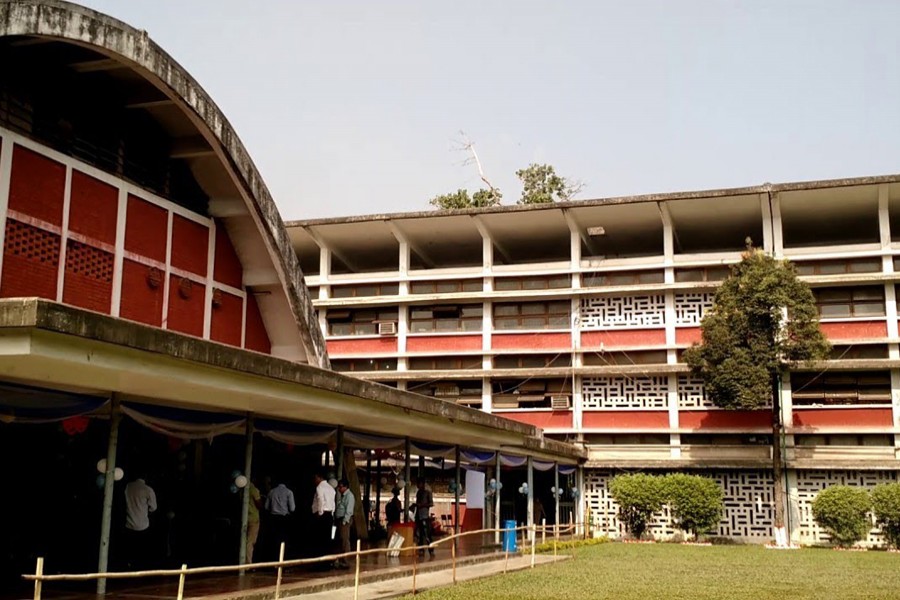Dipto Roy Dip, a second-year student of Economics, is a resident of Jagannath Hall at the University of Dhaka (DU). Life was tough for him during the COVID-19 Pandemic as he had no tuition – his prime source of income.
And now that he has returned to the university, he is flabbergasted at the upward spiral of food prices in the campus.
He used to have three tuitions, now he has only one which means he has lost nearly two-thirds of his income while his expenditure has skyrocketed.
For his classmate Jubayed Hassan Ovi, a resident of the Haji Muhammad Muhsin Hall, the story has the same pessimistic overtone. He can barely sustain his life at DU residential halls. And there is hardly anyone to see this.
In hall canteens, food prices have risen nearly 25-30 per cent in the last month. Such is the predicament of the residential students, most of whom are from middle and lower-middle-class families and do not take money from their parents.
The non-residents do not have it easier either. For students who use varsity buses to commute to classes from home, the food price hike has been even unkind.
Khichuri at Hakim Chattar has seen a 5 taka increase in its price, as has the rice-stand at the gate of Suhrawardy Uddan. They have to pay more even for the famous TSC tea now.
And for those who have to take a bus to arrive at the varsity, the recent bus-fare raise has been a real burden. Now they have to worry about even coming to the classes as the cost of attending them has become incredibly high.
Dhaka is the thirteenth most expensive city in Asia and as of now, it is certainly defending its position fiercely with its sky-high living expenses. For Dhaka University students, life is tough since food and lodging are not the only expenses in life.
Countries are no stranger to inflation, nor are the policymakers who deal with the situation that is being aggravated. However, hardly there has been such blatant indifference to the general suffering of the populace before.
And Dhaka University is a perfect test subject to scrutinise the situation.
COVID-19 has left a strange stain on the Dhaka University students. Most of them have lost a year of their academic lives, some of them have come out of the pandemic as battered souls burdened by the weight of their fragmented lives.
Nowadays, there is a common saying in the TSC – “You are not the same person anymore.”
And it does justice to the neo-normal situation. Most of the students have suffered substantial income loss in the lockdown and they have yet to cope with the loss. During the pandemic, families of the young kids have been less willing to employ tutors as a result of the ongoing recession and income loss, and irregular payment has become a norm.
Private tuition is the single most important source of income for DU students, followed by part-time jobs. The looming recession has curtailed part-time job opportunities as well.
And recent inflation and price-hikes have made lives miserable for all of us and hardly the authorities care about it. The food prices have not been raised in two places only - the DUCSU canteen and TSC Cafeteria.
However, students have to compete with the outsiders to get cheap food there. And after the recent ‘Khuda Lagse fiasco,’ the DU authority has removed all street food vendors from the campus. The effectiveness of such drastic measures can be questioned.
Last month, the university authority decided to increase food prices in the campus and residential halls. Thus started the tales of woe where the voiceless students are forced to comply with the situation.
The problem is that the price-hike is justified given the current situation at commodity markets where prices of necessary goods are on the rise for a while. So the students’ sufferings are part of a bigger picture of the ongoing crisis.
To get insights into the crisis, the writer interviewed Zulias Cizar Talukdar, the founder of the Dhaka University Nirapotta Moncha.
Zulias Cizar thinks that despite the price-hike being justified, the students are unable to bear it.
“The authority should prioritize the students first, and not think like a market-oriented governing body. The market demands a price hike but the authorities should think of the students first and increase the food subsidies to offset the effects of inflation.”
Rice and daal, in his opinion, should be free while the meals should be more subsidised.
In his words, “There are enough funds in the university to make rice and daal free for all students. The authority should pry into the fund wastages in the university to make necessary arrangements.”
Before waving the demand away for being too outlandish, it should be noted that the DU has a development budget of Tk 90 billion, most of which is spent on infrastructural development and renovation. The cost of unplanned programmes and expansions is numerous as well.
So, if the new construction spree is balanced with the crying needs of the students, funds will not be an issue.
The absence of an elected student representative body like DUCSU and Hall Unions is another key point to such a plight, as the students have to rely on the generosity of the teachers to state their demands – said Zulias Cizar.
It also prevents the DU students from uniting and voice their concerns to the authorities. So, he stated the necessity of a new elected student representative body.
The anguish of the thirty thousand DU students continues due to such drastic price-hikes at the university
It can be safely assumed that the glorious hundredth year of the university should not be marred with such affliction that would prevent the students from celebrating such a historic occasion. Fireworks and lavish soirees do not go well with distressed minds.


